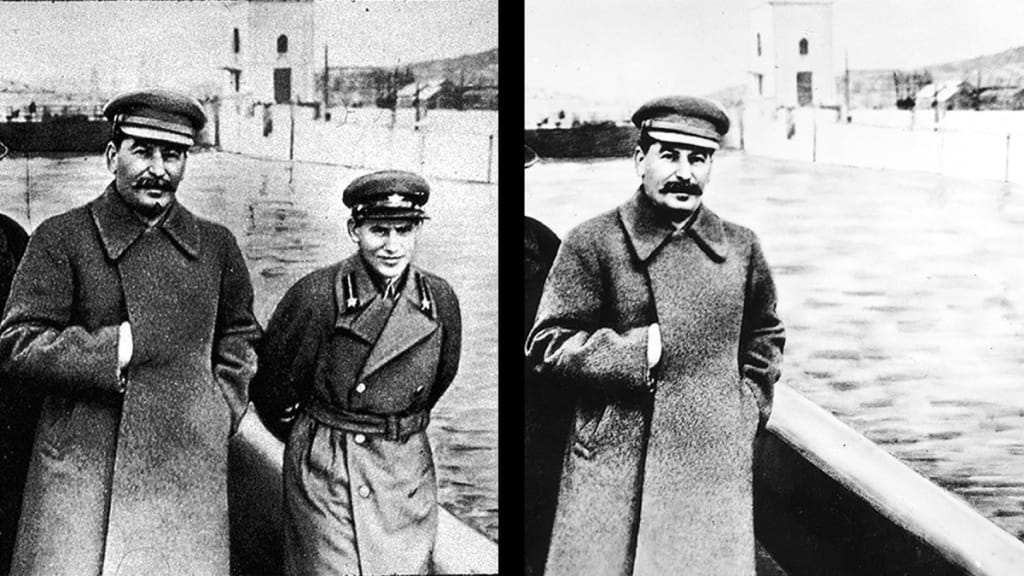Here are A Few Examples of Propaganda
"If everyone is thinking alike, then somebody isn't thinking." - George S. Patton

Shakespeare Propaganda (Tudor Propaganda).
Shakespeare propaganda, or Tudor propaganda (as it is also known) refers to Eight of Shakespeare’s historical plays – Richard II, Henry IV Parts 1 and 2, Henry V, Henry VI Parts 1,2 and 3, and Richard III.
These plays cover the period in English history stretching from 1396 to 1485. Some of the major events of this period are the resumption of the Hundred Years War by Henry V, the influence of Joan of Arc on the French monarchy, the Wars of the Roses, and the beginning of the short-lived but extremely influential Tudor dynasty in England.
The basic issue running through the history plays from Richard II through Richard III is the concept of the divine right of kings.
The concept of divine right was a widespread and essentially popular theory of its time. Religion was the controlling factor in the Middle Ages; all political systems were justified in some way along religious lines.
Another reason for Elizabethan attitudes toward kingship may be traced to the Wars of the Roses. The chaos occasioned by the continual rebellions, depositions, restorations and political murders of the 1400s made the divinely appointed absolute monarchy with its stabilizing effect (and despite the possibilities for despotism also inherent in it) more appealing than it had previously been.
Finally, this theory filled the need of the Tudor dynasty to stress absolute obedience to royal authority to implement their policy.
The condemnation of a usurper was not due solely to the belief that kings were accountable only to God and resistance to them as sin.
Another important aspect of the sixteenth-century attitude toward usurpation is based on the oath of fealty that all subjects make to a new ruler. Subsequent opposition to royal authority constitutes breaking that oath that binds a vassal to his sovereign. In the eyes of Elizabethans, "the traitor incurred divine vengeance for despising the sacredness of his oath and for disregarding sanctioned authority."
Taken together, these plays can also be seen as a type of morality play beginning with Henry IV’s usurpation of his cousin’s throne which disrupts the social order and which is ultimately set right by the victory of Henry Tudor over another usurper, Richard III.
In 2012 the body of Richard III was discovered buried underneath a car park in the city of Leicester. Until then Richard III's image and reputation of an evil villain king, who stole the throne from his nephews and killed them in the tower had been unchallenged for centuries. Many revelations have been made since Richard III's discovery.
Historians believe that his last few words were probably something along the lines of "treason, treason, treason" as he was betrayed by his own men at the very last moment. The infamous line in the historical play of Richard III: 'My horse, my horse, my kingdom for a horse!' is one of the many reasons why the last Plantagenet king's reputation has tainted by the will of a Tudor. This image of Richard III is now considered to be one of Britain's Biggest Fibs and is only a play.
Remember this, history is always written by the victors. What would the history books have to say if Richard did win the Battle of Bosworth that day? How different would it all be? Of course, this is all what if's and strictly hypothetical, and yet it reminds us to question everything we think we know about our history.
Lucy Worsley's Britain's Biggest Fibs: Episode One - War of the Roses https://www.youtube.com/watch?v=ReaHYCmb7fg
The Nazis started advocating clear messages tailored to a broad range of people and their problems. The populist propaganda aimed to exploit people’s fear of uncertainty and instability. These messages varied from ‘Bread and Work’, aimed at the working class and the fear of unemployment, to a ‘Mother and Child’ poster portraying the Nazi ideals regarding women. The most prominently featured focus in Nazi propaganda was of course against the Jewish and Communist and other minorities, labelling them as enemies of the German people.
Joseph Goebbels was key to the Nazi's use of propaganda to increase their appeal. Goebbels joined the Nazi Party in 1924 and became the Gauleiter (Regional Leader of the Nazi Party) for Berlin in 1926. Goebbels used a combination of modern media, such as films and radio, and traditional campaigning tools such as posters and newspapers to reach as many people as possible. It was through this technique that he began to build an image of Hitler as a strong, stable leader that Germany needed to become a great power again.
Goebbels's success eventually led to him being appointed Reich Minister of Propaganda in 1933.
He once said: “There are two ways to make a revolution. You can blast your enemy with machine guns until he acknowledges the superiority of those holding the machine guns. That is one way. Or you can transform the nation through a revolution of the spirit …"
Propaganda was the operational method of the Third Reich, the idea that projected the ideology. Hitler’s chief architect, Albert Speer, told the Nuremberg Tribunal “that what distinguished the Third Reich from all previous dictatorships was its use of all the means of communication to sustain itself and to deprive its objects of the power of independent thought.”
Hitler was a magician of illusion. The cultural historian Piers Brendon has described propaganda as the “gospel” of Nazism and notes that Goebbels “liked to say that Jesus Christ has been a master of propaganda and that the propagandist must be the man with the greatest knowledge of souls.”
These tactics are now the basic blueprints of state propaganda and are essential for any dictatorship. If you've ever watched How to Become a Tyrant, narrated by Peter Dinklage then you know exactly what I am referring to here, and if you haven't seen it, there's a link below -
https://www.theholocaustexplained.org/the-nazi-rise-to-power/the-nazi-rise-to-power/propaganda/
How to Become a Tyrant: Episode One - Seize Power https://www.netflix.com/watch/81083002?trackId=200257859
Stalin vs. Trotsky
Throughout his rule, Joseph Stalin ruthlessly used propaganda and terror to inspire craven loyalty in Russian citizens and maintain absolute power within the communist party and the politburo. Stalin saw the role of propaganda as strengthening his totalitarian regime. He believed all mediums of communication: radio, television, newspapers, art, theatre and posters could be used to further his aims. Education in the USSR also taught communist principles and glorified Stain’s leadership.
He honed a cult of personality with the USSR. This is whereby propaganda is used to portray the image of an all-wise, all-knowing leader. Like many leaders before him, history was rewritten to cast Stalin as a hero of the November Revolution and Civil War. Street names and cities, such as Stalingrad, were named after him. Statues and posters of him were widespread. Music, art and poetry praised him as the “most learned of men” and the “fount of all wisdom”. He was equal to Lenin: “Stalin is the new Lenin of today”. Propaganda was further used to promote Stalin’s controversial policies of collectivisation and rapid industrialisation.
Stalin’s policies, however, still led to opposition and he feared a conspiracy against him. Critique by Trotsky angered him and he claimed there was a Trotskyite plot to overthrow his government. He wanted to “destroy the men who might form an alternative government” and create a new class of uber loyal leaders and followers, completely consolidating his power within the USSR.
Stalin's 'Show trials' were a triumph in propaganda for Stalin. Soviet history books spoke of the “Trotskyite underlings” and “judas Trotsky” regarding this. Daily reports created widespread fear and panic, linking a major conspiracy with Nazi Germany.
British diplomats and The New York Times believed the trials were fair and legal, but as an unknown spectator puts it: “200,000 people were bedazzled by propaganda”.
Soviet politician Andrey Vyshinsky remarks “ The graves of the odious traitors will be overgrown with weeds, covered with the eternal contempt of the soviet people”.
Stalin's wave of propaganda and terror was so successful at consolidating his power that many of those arrested “inscribed ‘long live stalin’ in blood on the walls of their prison”.
The show trials left Stalin in complete control of Russia, with ordinary Russians being so terrorised by the litany of crimes committed that it prevented them from questioning those crimes. By 1940 every single member of Lenin’s politburo was dead except Stalin.
Trotsky was blamed for inciting much of the opposition against Stalin, thus he was assassinated in Mexico in 1940. Stalin felt so threatened by Trotsky that even after having him killed he essentially created the first case of photoshop in history. By 1938 7 million people were held in Soviet labour camps. Thousands were expelled from the communist party and 300,000 were deemed enemies of the people. He ensured that no institution would ever be strong enough to bring down his totalitarian reign.
20 million Russians were taken from their ordinary lives and 18 million went through gulags under Stalin's reign. Stalin ensured that terror and propaganda loomed in every possible aspect of citizens' lives, from education to work to leisure, consolidating his leadership and causing all Russian citizens to feel the expectation of proving their undivided loyalty to him.
Check out the fourth episode of How to Become a Tyrant, which follows Stalin's absolute control of the truth. Link below:
How to Become a Tyrant: Episode Four - Control the Truth https://www.netflix.com/watch/81083005?trackId=200257859
Uncle Sam and Rosie the Riveter
Uncle Sam was supposedly based on a real person, Sam Wilson, a businessman during the War of 1812. Though the image of Uncle Sam was made popular by Thomas Nast and the cartoonists of Puck Magazine, the portrait of Uncle Sam created by James Montgomery Flagg for the July 6, 1916, issue of Leslie’s Weekly soon led to Uncle Sam’s iconic status.
The image was used to encourage men to enlist in the military and to encourage civilian support for the entry of the U.S. into World War I. During WW1 it was pretty common to find these types of propaganda posters. In both the United States and Great Britain, WW1 posters were full of propaganda. Praise and honour for soldiers, hiding the horrors of the trenches from civilian sight. They were used to encourage men to join the frontline and make citizens shame those who stayed and tarnished them as cowards. It worked and it went as far as this in Britain that it become illegal to be a pacifist.
Uncle Sam was officially adopted as a national symbol of the United States of America in 1950.
Rosie the Riveter is an allegorical cultural icon of World War II, representing the women who worked in factories and shipyards during this time many of whom produced munitions and war supplies. These women sometimes took entirely new jobs replacing the male workers who joined the military.
Once more here are examples of governments popularising people's fears, grievances and rights to push their agenda. Rosie the Riveter created a sense of recognition of Women's Rights under the guise of equality. When war is in the air, hope despairs and citizens become more obedient. To use a strong woman to proclaim equality and appeal to ordinary women to get them to do the work is extremely clever as it is not too far from the truth as women did get the right to vote after WW2 because of their contribution to the war effort (U.K.).
References: https://blogs.loc.gov/teachers/2014/07/uncle-sam-american-symbol-american-icon/
https://www.history.com/news/rosie-the-riveter-inspiration
Propaganda in North Korea
North Korean Propaganda posters are very similar to the messages portrayed by Socialist countries. North Korean propaganda posters focus on military might, utopian society and devotion to the state, and the leader's personality.
Most propaganda is based on the Juche ideology and the promotion of the Workers' Party of Korea. The first syllable, "Ju", means the man; the second syllable, "che", means the body of oneself.
Article 3 of the Socialist Constitution proclaims, "The DPRK is guided in its activities by the Juche idea, a world outlook centred on people, a revolutionary ideology for achieving the independence of the masses of people."
North Korean propaganda was crucial to the formation and promotion of the cult of personality centred around the founder of the DPRK, Kim Il-sung. The Soviet Union used propaganda to develop a cult of personality around Kim, particularly as a Korean resistance fighter, as soon as they put him in power.
Americans are depicted particularly negatively. They are presented as an inherently evil race, with whom hostility is the only possible relationship. The Korean War is used as a source for atrocities, less for the bombing raids than on charges of the massacre.
June 25 is considered the start of "Struggle Against US Imperialism Month" (informally called "Hate America Month" in the U.S. media), which is commemorated by anti-U.S. mass rallies at Kim Il-sung Square, Pyongyang.
In 2018, these rallies were cancelled in what the Associated Press called "another sign of detente following the summit between leader Kim Jong Un and U.S. President Donald Trump."
North Korean Propaganda posters are very similar to the messages portrayed by Socialist countries. Their propaganda posters focus on military might, utopian society and devotion to the state, and similarily to Stalin, the leader's personality. Furthermore, slogans are similar to that of Maoist China, containing calls to action and praises for the leadership.
Other examples like fine art often depict militaristic themes. The Flower Girl, a revolutionary opera allegedly penned by Kim Il-sung himself, was turned into a movie, the most popular one in North Korea. It depicts its heroine's sufferings in the colonial era until her partisan brother returns to exact vengeance on their oppressive landlord, at which point she pledges support for the revolution.
Check out the final episode of How to Become a Tyrant, where it shows how to 'rule forever'. Link below:
Reference: https://en.wikipedia.org/wiki/Propaganda_in_North_Korea
How to Become a Tyrant: Episode Six - Rule Forever https://www.netflix.com/watch/81083007?trackId=200257859
In an age of information in abundance, we have to take everything we see, hear and read with a pinch of salt. Misinformation on the internet is rife, and I wanted to present these examples as a reminder to everyone that propaganda is everywhere, as is censorship. The information war is in full swing, my advice; challenge and question everything, and don't stay in the rabbit hole for too long but make sure to stay awake.
Good luck out there.
About the Creator
Rosie J. Sargent
Hello, my lovelies! Welcome, I write everything from the very strange to the wonderful; daring and most certainly different. I am an avid coffee drinker and truth advocate.
Follow me on Twitter/X @rosiejsargent97
Reader insights
Outstanding
Excellent work. Looking forward to reading more!
Top insights
Compelling and original writing
Creative use of language & vocab
Excellent storytelling
Original narrative & well developed characters
Expert insights and opinions
Arguments were carefully researched and presented






Comments (1)
I'm so glad to have found this article today. I found this submission by accident today. I am currently working on a literary piece from the 100-year war and at present, enjoy reading ANYthing that has to do with it. I'm glad I held on for the whole thing. Great work!